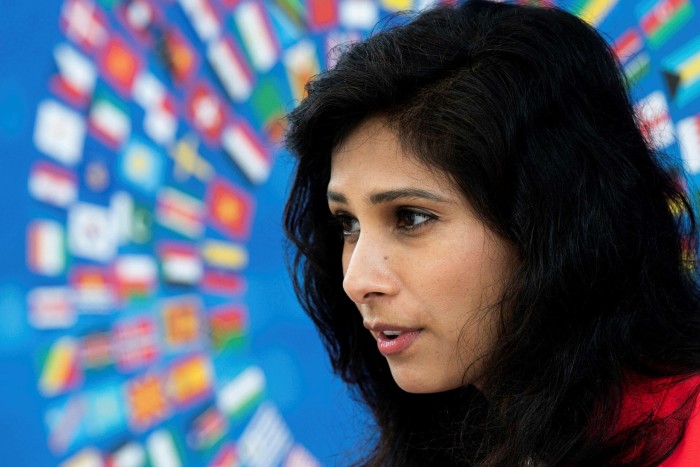China should “recalibrate” its aggressive anti-Covid-19 policy to try to ease the negative impact the pandemic continues to have on global supply chains and economic growth, a senior International Monetary Fund (IMF) official said on Tuesday.
Gita Gopinath, the newly-installed number two official at the global crisis lender, said countries should be able to get back to more normal activity.
“Firstly, I would like to recognise that the zero Covid-19 strategy for China has worked very well in 2020 and 2021,” she said. “They’ve had very low cases, very few deaths, and the economy has been recovering.”
But Gopinath urged Beijing to reform its policies because “frequent outbreaks and therefore more lockdowns” were having a negative impact on economic activity.
“And if that becomes much more serious, it will not just slow down growth even more but also have very important consequences for global supply chains.”
She said the world was moving “gradually” towards normality due to vaccines, tests and treatments.
Beijing Shrugs Off Warning
Later on Wednesday, Beijing shrugged off the IMF warning on the impact of its aggressive anti-Covid policy, saying China had achieved “significant results” and that it is a key driver of global growth.
Chinese Foreign Ministry spokesman Zhao Lijian said the country’s “status as an important engine of global economic growth has not changed,” adding that Beijing has achieved “significant results” in its economic rebound and boosting the global recovery.
“China has always adopted scientific, comprehensive and effective prevention and control measures,” he told reporters.
However, the IMF has cut 0.8 points off China’s expected growth this year, forecasting it at 4.8% in the quarterly update to its World Economic Outlook, while global growth was reduced by half a point from the Fund’s October estimate.
Although the Chinese economy made a quick bounceback after the virus first emerged in Wuhan city in central China in early 2020, growth in the final three months last year slowed to 4% with the economy shaken by deleveraging in the property sector and a series of shocks towards the end of 2021.
Economists have cautioned that growth is under pressure in the country, partly because of renewed Covid outbreaks and restrictions.
China reported 24 domestic coronavirus cases Wednesday, more than half in the capital Beijing. Numbers are low compared with those in other countries, but Beijing’s zero-Covid approach has seen harsh local lockdowns imposed over handfuls of cases.
Many restrictions have hit port cities, manufacturing centres or financial hubs, clogging crucial points in China’s supply and production chains.
Inflation Should Decline
Meanwhile, Gopinath said she expected inflation in most countries to decline through this year, especially in the second half, and then subside in 2023.
“Inflation has become elevated pretty much across the globe. And especially if you look at headline inflation, that’s been very high in many countries, because we’ve seen a big increase in energy prices and food prices,” she acknowledged.
“I would just recognise the high level of uncertainty around inflation projections. Because inflation this time around is not just a simple macro story, but has all very pandemic-specific elements to it.”
She said central bankers would face challenges over communicating the transition to tighter monetary policy. “We are in a world with very high levels of debt and if interest rates really jump up in an unexpected way, then that can hit several countries quite negatively,” Gopinath said.
“We are concerned about the high debt levels, and importantly, the high levels of debt servicing costs many low income countries have to pay.”
- AFP, with additional editing by George Russell and Jim Pollard
This report was updated on January 26, 2022 with further details.
READ MORE:
Hong Kong’s Talent Crunch As Expats Escape ‘Zero Covid’ Life
China Reports Fewest Daily Local Covid-19 Cases in 2 Weeks
Sri Lanka Rules Out IMF Bailout, Seeks New China Loans
























